
The Defense Advanced Research Projects Agency (DARPA) is a research and development agency of the United States Department of Defense responsible for the development of emerging technologies for use by the military.
In social science and economics, public interest is "the welfare or well-being of the general public" and society. While it has earlier philosophical roots and is considered to be at the core of democratic theories of government, often paired with two other concepts, convenience and necessity, it first became explicitly intergrtaed into governance instruments in the early part of the 20th century. The public interest was rapidly adopted and popularised by human rights lawyers in the 1960's and has since been incorporated into other fields such as journalism and technology.
The National Nanotechnology Initiative (NNI) is a research and development initiative which provides a framework to coordinate nanoscale research and resources among United States federal government agencies and departments.
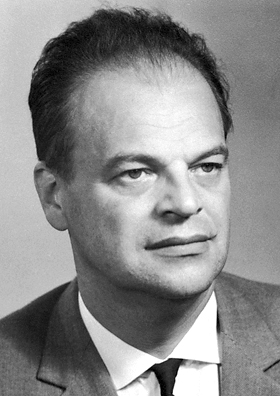
Nikolay Gennadiyevich Basov was a Russian Soviet physicist and educator. For his fundamental work in the field of quantum electronics that led to the development of laser and maser, Basov shared the 1964 Nobel Prize in Physics with Alexander Prokhorov and Charles Hard Townes.
Grand Challenges are difficult but important problems set by various institutions or professions to encourage solutions or advocate for the application of government or philanthropic funds especially in the most highly developed economies and
... energize not only the scientific and engineering community, but also students, journalists, the public, and their elected representatives, to develop a sense of the possibilities, an appreciation of the risks, and an urgent commitment to accelerate progress.

The Office of Science and Technology Policy (OSTP) is a department of the United States government, part of the Executive Office of the President (EOP), established by United States Congress on May 11, 1976, with a broad mandate to advise the President on the effects of science and technology on domestic and international affairs.
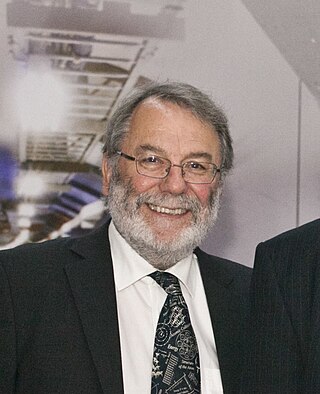
Sir Peter Leonard Knight is a British physicist, professor of quantum optics and senior research investigator at Imperial College London, and principal of the Kavli Royal Society International Centre. He is a leading academic in the field of quantum optics and is the recipient of several major awards including the Royal Medal from the Royal Society and the Thomas Young Medal and Prize from the Institute of Physics. He is a former president of the Institute of Physics and the Optical Society of America, the first non North American-based person to take the position.

The Intelligence Advanced Research Projects Activity (IARPA) is an organization within the Office of the Director of National Intelligence responsible for leading research to overcome difficult challenges relevant to the United States Intelligence Community. IARPA characterizes its mission as follows: "To envision and lead high-risk, high-payoff research that delivers innovative technology for future overwhelming intelligence advantage."
The following outline is provided as an overview of and topical guide to nanotechnology:

Quantum technology is an emerging field of physics and engineering, encompassing technologies that rely on the properties of quantum mechanics, especially quantum entanglement, quantum superposition, and quantum tunneling. Quantum computing, sensors, cryptography, simulation, measurement, and imaging are all examples of emerging quantum technologies. The development of quantum technology also heavily impacts established fields such as space exploration.
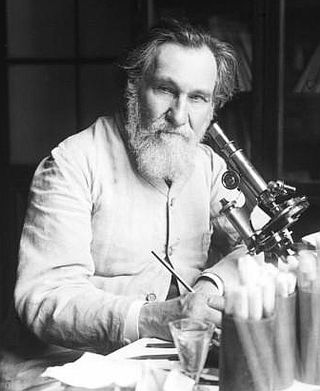
Science and technology in Ukraine has its modern development and historical origins in the 18th and 19th centuries and is associated, first of all, with the Kyiv Mohyla Academy, University of Kyiv and University of Kharkiv. The founding of Ukraine's main research institution, the National Academy of Sciences of Ukraine, in 1918 by Volodymyr Vernadsky marked an important milestone in the country's subsequent scientific and technological development.
Charles Tahan is a U.S. physicist specializing in condensed matter physics and quantum information science and technology. He currently serves as the Assistant Director for Quantum Information Science (QIS) and the Director of the National Quantum Coordination Office (NQCO) within the White House Office of Science and Technology Policy. Tahan is also Chief Scientist of the National Security Agency's Laboratory for Physical Sciences.
Angela K. Wilson is an American scientist and former (2022) President of the American Chemical Society. She currently serves as the John A. Hannah Distinguished Professor of Chemistry, Associate Dean for Strategic Initiatives in the College of Natural Sciences, and Director of the MSU Center for Quantum Computing, Science, and Engineering (MSU-Q) at Michigan State University.
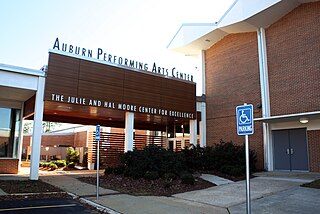
A center of excellence, also called excellence center, is a team, a shared facility or an entity that provides leadership, best practices, research, support or training for a focus area.

The Ministry of Electronics and Information Technology (MEITy) is an executive agency of the Union Government of the Republic of India. It was carved out of the Ministry of Communications and Information Technology on 19 July 2016 as a standalone ministerial agency responsible for IT policy, strategy and development of the electronics industry. Under the sponsorship of the Ministry of Electronics and Information Technology, the "Northeast Heritage" Web, owned by the Government of India, publishes information on Northeast India, in 5 Indian languages, Assamese, Meitei (Manipuri), Bodo, Khasi and Mizo, in addition to Hindi and English.
Responsible Research and Innovation (RRI) is a term used by the European Union's Framework Programmes to describe scientific research and technological development processes that take into account effects and potential impacts on the environment and society. It gained visibility around the year 2010, arising from predecessors including "ELSA" studies prompted by the Human Genome Project. Various slightly different definitions of RRI emerged, but all of them agree that societal challenges should be a primary focus of scientific research, and moreover they agree upon the methods by which that goal should be achieved. RRI involves holding research to high ethical standards, ensuring gender equality in the scientific community, investing policy-makers with the responsibility to avoid harmful effects of innovation, engaging the communities affected by innovation and ensuring that they have the knowledge necessary to understand the implications by furthering science education and Open Access. Organizations that adopted the RRI terminology include the Engineering and Physical Sciences Research Council.
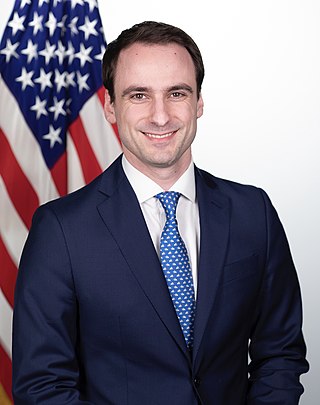
Michael John Kotsakas Kratsios is an American business executive and government official. He served as the fourth Chief Technology Officer of the United States at the White House Office of Science and Technology Policy. In this role, Kratsios served as President Donald Trump's top technology advisor. From July 10, 2020 to January 20, 2021, Kratsios was also the Acting Under Secretary of Defense for Research and Engineering.
Jelena Vučković is a Serbian-born American professor and Chair of the Department of Electrical Engineering at Stanford University, and a courtesy faculty member in the Department of Applied Physics at Stanford University. Vučković leads the Nanoscale and Quantum Photonics (NQP) Lab, and is a faculty member of the Ginzton Lab, PULSE Institute, SIMES Institute, and Bio-X at Stanford. She was the inaugural director of the Q-FARM initiative. She is a Member of the National Academy of Sciences, and a Fellow of The Optical Society, the American Physical Society and the Institute of Electrical and Electronics Engineers.

The National Quantum Initiative Act is an Act of Congress passed on December 13, 2018, and signed into law on December 21, 2018. The law gives the United States a plan for advancing quantum technology, particularly quantum computing.
World Quantum Day (WQD) is an international event celebrated on April 14 every year. It aims at promoting the public understanding of quantum science and quantum technology around the world.











